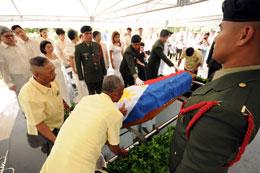We are disappointed. …we are outraged”

Filipinos around the world are demanding that exhumation of former Philippine dictator Ferdinand Marcos body, after he was given a secret hero’s burial.
The hasty burial at a heroes’ cemetery in Manila occurred after the Supreme Court voted 9-5 with one abstention to dismiss petitions opposing President Rodrigo Duterte’s approval of Marcos’s burial at the cemetery, where ex-presidents, soldiers and national artists have been laid to rest.
The ruling, opponents say rolled back the democratic triumph when Filipinos ousted the strongman in a “people power” revolt three decades ago.
“We are disappointed. We are heartbroken. We are outraged,” a coalition of nearly 40 groups opposed to Marcos’s burial at the cemetery said in a joint statement. “With this decision, the very definition of hero is now in question.”
The dictator’s son and namesake, former Sen. Ferdinand “Bongbong Marcos Jr. thanked the high court for taking “a magnanimous act to uphold the rule of law” and expresssed his gratitude to Duterte.
“It is our sincerest hope that this will lead the nation towards healing,” Marcos Jr. said after decades of discord over the burial of his father.
The surprise move by the Marcos family and the government to bury him so quickly after the Supreme Court verdict, with appeals still to be heard, caused further outrage.
Barry Gutierrez, counsel for the anti-Marcos court petitioners, said the burial was illegal because of the outstanding appeals.
"We are shocked and angered," Gutierrez said.
A petition has now been filed exhume the body while multiple rallies to protest the move are being planned in the Philippines and around the world.
President Rodrigo Duterte himself claimed he did not know the remains of the late dictator Ferdinand Marcos would be buried at the Libingan ng mga Bayani last Friday, November 18.
The President added that those who cannot forgive the Marcoses will just have to live with their pain.
Groups opposing the burial are also set to hold two grand rallies to further send their message of disdain, particularly to the President.
Groups led by the Coalition Against the Return of the Marcoses to Malacañang (Carmma) will have a grand rally on Friday, November 25, at 4 pm, in time for Duterte's arrival from the Asia-Pacific Economic Cooperation (APEC) Summit in Peru.
Meanwhile, the Coalition Against Marcos Burial at the Libingan ng mga Bayani (Camb-LNMB) will "occupy" the national shrine on November 30, Bonifacio Day.
Victims of torture during the Martial Law years of the Marcos dictatorship have been holding rallies over the past week In solidarity with them were those who took part in a peaceful revolution in 1986 that overthrew Marcos, forcing him and his family to flee to Hawaii where he died in 1989.
He was never buried. Marcos' remains were refrigerated crypt in his home province in northern Philippines.
"We cannot allow our history to be rewritten. We must never forget," said Che Lipa, who was at the protest with his wife, Lita.
The couple, both 70, met in university where Che Lipa was already a student activist who opposed Martial Law. In 1986, the couple and their young children marched some 35 kilometers from their home to EDSA, the Philippine capital's major highway, where civilians gathered for a peaceful face off with the military.
"I was one of those who stopped the (military) tanks back then," Lipa proudly recalled.
Marcos ruled the Philippines for two decades until forced into US exile by the "People Power" revolution, a largely peaceful event that inspired democracy movements throughout Asia and around the world.
Marcos, his infamously flamboyant wife Imelda, and their cronies plundered up to $10 billion from state coffers during his rule, according to government investigators and historians.
The dictator also oversaw widespread human rights abuses to maintain his control of the country and enable his plundering, with thousands of people killed and tortured, previous Philippine governments said.
Anti-corruption watchdog Transparency International in 2004 named Marcos the second most corrupt leader of all time, behind Indonesian dictator Suharto.
The Philippines' foreign debt went from $2.67 billion in 1972, when Marcos declared martial law, to $28.2 billion in 1986, according to the World Bank.
After Marcos died in Hawaii in 1989, his family began a successful political comeback and tried repeatedly to have him buried at the heroes' cemetery, where other presidents and celebrated military figures are interred.
Imelda became a congresswoman and fended off all corruption charges against her.
Two of her children established themselves as influential politicians. Ferdinand "Bongbong" Marcos Jnr, was the more successful, becoming a senator before almost winning the vice presidency this year.
However previous presidents had refused to allow the burial in the heroes' cemetery because of Marcos's crimes, so the family kept the preserved body in a glass casket at his home in the northern province of Ilocos Norte.
The family's fortunes changed with the election of Duterte, a longtime ally of the Marcos family, as president in May this year.
He said Marcos deserved to be buried at the heroes' cemetery based on the fact he had been a president and a veteran of World War II.
Duterte also said he owed loyalty to the family because his father served in the Marcos government and the family had helped fund his election campaign.
At the assembly of the Campaign Against the Return of the Marcoses in Malacañang (Carmma) on Nov. 19, groups announced that they will stage a massive protest on Nov. 25, to make President Duterte feel the true sentiment of the Filipino people against the Marcoses, martial law, and its legacy of impunity.






